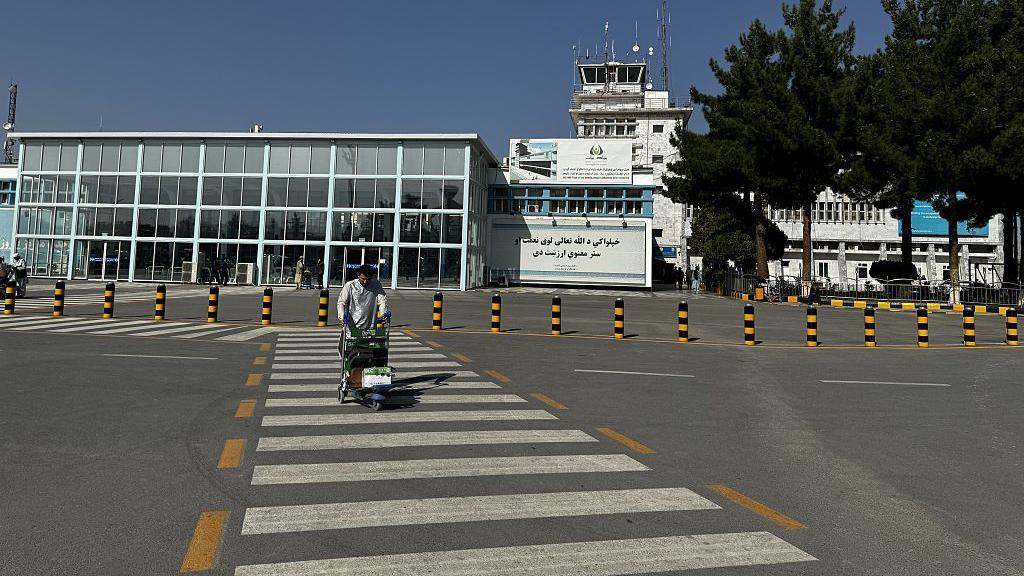“`html
Afghanistan’s primary airport is experiencing significant disruption following a nationwide internet shutdown implemented by the Taliban government.
While the Taliban has not provided an official explanation for the measure, which began on Monday and is indefinite, the United Nations has warned of potentially severe consequences.
Communication both within Afghanistan and with the international community has been substantially impaired. Essential services, including banking, payment systems, and access to online education – a critical resource for many women and girls – are also affected.
According to local sources, Kabul’s airport is “nearly deserted,” with no apparent flight arrivals or departures.
#Flight tracking service Flightradar24 data indicates that several flights scheduled for Tuesday were canceled, while the status of numerous others remained “unknown.”
A passenger planning to arrive at Kabul International Airport on Tuesday was informed that flights would be suspended until at least Thursday.
Another resident reported that all flights from Kabul airport have been canceled since Monday evening.
The individual noted that while life in Kabul “seems to be normal” on the surface, “no communication at all” is available across the country.
The United Nations Assistance Mission in Afghanistan (UNAMA) has urged the Taliban authorities to immediately restore full internet and telecommunications access nationwide.
In a statement, UNAMA emphasized that “The cut in access has left Afghanistan almost completely cut off from the outside world, and risks inflicting significant harm on the Afghan people, including by threatening economic stability and exacerbating one of the world’s worst humanitarian crises.”
Prior to this nationwide shutdown, the Taliban government had been incrementally severing fiber-optic internet connections across several provinces for weeks.
While initially impacting a limited number of provinces, the disruption reached the capital, Kabul, on Monday, with residents reporting that their fiber-optic internet service ceased functioning around 17:00 local time (12:30 GMT).
On Tuesday, many Afghans awoke to find essential services paralyzed.
Najibullah, a 42-year-old shopkeeper in Kabul, told AFP that residents felt “blind without phones and internet.”
“All our business relies on mobiles. The deliveries are with mobiles. It’s like a holiday, everyone is at home. The market is totally frozen.”
Another Kabul resident, speaking anonymously, reported that banks remained open but experienced large crowds attempting to withdraw funds, with only “very little cash” available for disbursement.
Conversely, a money changer in Helmand province stated that all banks in his area were closed, preventing him from processing payments.
Diplomatic officials had previously warned the BBC that the internet disruptions could adversely affect banking and e-commerce systems nationwide.
International news agencies have also reported losing contact with their offices in Kabul, with mobile internet and satellite TV experiencing significant disruptions across the country.
Tolo News, a privately owned Afghan news channel, advised viewers to follow its social media pages for updates, anticipating interruptions to its television and radio broadcasts.
One Kabul-based journalist informed the BBC that they were unable to contact interviewees, necessitating the dispatch of camera crews directly to their homes.
“We have never experienced such [a] thing,” the journalist added.
Numerous residents, requesting anonymity, have reported that their businesses and daily lives have been severely affected by the internet shutdown.
A money changer in Takhar province reported that his daughters’ online English classes had been disrupted. “Their last opportunity to study and stay engaged is now gone,” he stated.
Another woman previously told the BBC that she could not attend online classes since her home internet was cut off. “I had hoped to finish my studies and find an online job, but that dream has also been destroyed,” she said. “Without internet access, I don’t know what will happen next.”
In an earlier post on social network Mastodon.social, Netblocks stated that Afghanistan was “in the midst of a total internet blackout as Taliban authorities move to implement morality measures, with multiple networks disconnected through the morning in a stepwise manner; telephone services are currently also impacted”.
Earlier this month, a spokesperson for the Taliban governor in Balkh stated on X that the ban on fiber-optic internet was intended to curb “evils,” adding that authorities would explore alternatives.
The precise reason for this week’s shutdown remains unclear.
This shutdown represents the latest in a series of restrictions imposed by the Taliban since regaining power.
Earlier this month, they removed books written by women from the country’s university curriculum as part of a new ban that also prohibits the teaching of human rights and sexual harassment.
Women and girls have been disproportionately affected by these policies, being barred from accessing education beyond the age of 12. One of their last avenues for further training was eliminated in late 2024 with the quiet closure of midwifery courses.
A university student told the BBC that she had “no other choice except online study” after her midwifery course was banned. “When I heard that the internet had been cut, the world felt dark to me,” she said.
The Taliban retook control of Afghanistan in 2021 following a rapid advance, weeks after the withdrawal of US and other international forces.
Home workers say they struggle to get signal for calls and pub can’t always collect payments.
Peter and Barbie Reynolds, 80 and 76, said it was never explained to them why they were being held.
The deaths of Ghulam and Nazo’s children are evidence of a silent wave of mortality engulfing Afghanistan, where malnutrition is at unprecedented levels.
The migration, which runs until Wednesday, follows Sure’s acquisition of Airtel Vodafone.
Their son tells the BBC he is “overwhelmed” by release after nearly eight months in prison.
“`

